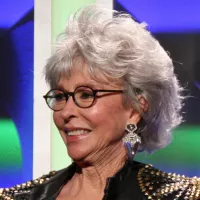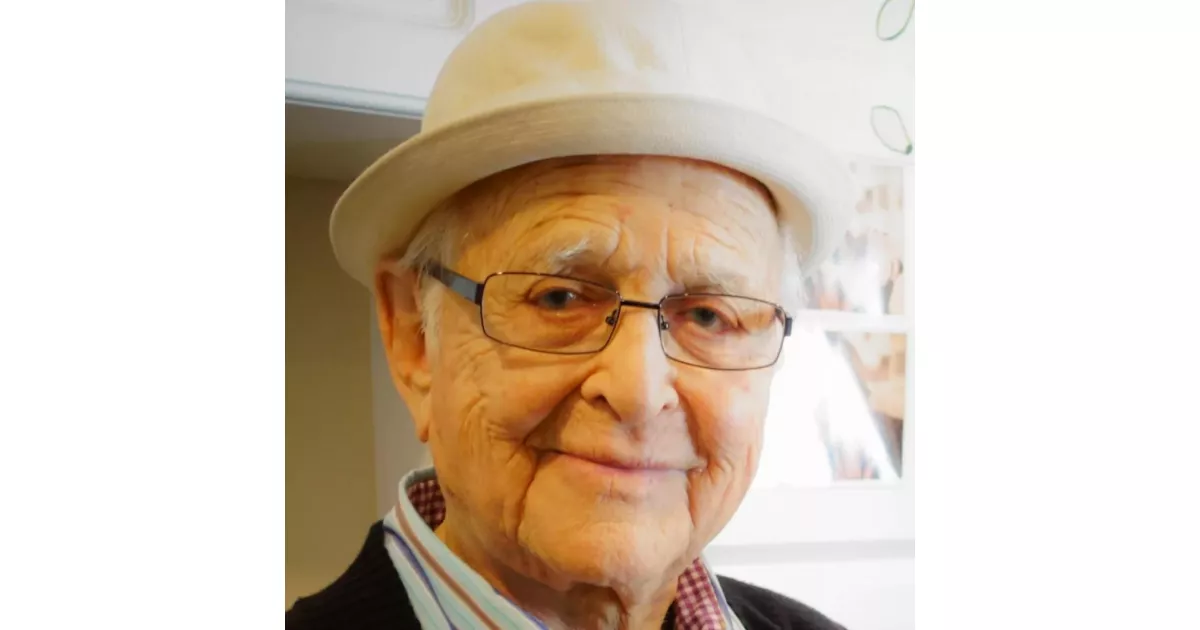Norman Lear was a highly influential American television writer and producer renowned for creating groundbreaking sitcoms during the 1970s. His most notable works include "All in the Family," "Maude," "Sanford and Son," "One Day at a Time," "The Jeffersons," and "Good Times." Lear's shows were revolutionary for their time, fearlessly addressing complex social and political issues within the comedic format, thereby sparking national conversations and shaping American pop culture. He produced, wrote, created, or developed over 100 shows.
July 27, 1922: Norman Lear Born
On July 27, 1922, Norman Milton Lear was born. He would later become a prolific American screenwriter and producer.
1925: Sister Claire Lear Brown Born
In 1925, Norman Lear's younger sister, Claire Lear Brown, was born.
1940: Graduates from Weaver High School
In 1940, Norman Lear graduated from Weaver High School in Hartford, Connecticut.
September 1942: Enlists in the United States Army Air Forces
In September 1942, Norman Lear enlisted in the United States Army Air Forces.
1942: Drops out of Emerson College
In 1942, Norman Lear dropped out of Emerson College in Boston to join the United States Army Air Forces.
1943: Married Charlotte Rosen
In 1943, Norman Lear married Charlotte Rosen.
1945: Discharged from the Army Air Forces
In 1945, Norman Lear was discharged from the Army Air Forces after serving in World War II.
1950: First Appearance on the Colgate Comedy Hour
In 1950, Norman Lear worked with Ed Simmons as a writer hired by Jerry Lewis three weeks before Martin and Lewis made their first appearance on the Colgate Comedy Hour.
1953: Guaranteed Record-Breaking Salary
In 1953, Norman Lear and Ed Simmons were guaranteed a record-breaking $52,000 each to write for five additional Martin and Lewis appearances on the Colgate Comedy Hour that year.
1954: Writer for Honestly, Celeste!
In 1954, Norman Lear was enlisted as a writer to salvage the new CBS sitcom Honestly, Celeste!, but the program was canceled after eight episodes.
1956: Opening Monologs for The Tennessee Ernie Ford Show
From 1956 to 1961, Norman Lear wrote some of the opening monologs for The Tennessee Ernie Ford Show.
1956: Divorced Charlotte Rosen
In 1956, Norman Lear divorced Charlotte Rosen.
1956: Married Frances Loeb
In 1956, Norman Lear married Frances Loeb.
1958: Tandem Productions Founded
In 1958, The Lear/Yorkin company was known as Tandem Productions.
1959: Creates The Deputy
In 1959, Norman Lear created his first television series, a half-hour western for Revue Studios called The Deputy, starring Henry Fonda.
1961: End of The Tennessee Ernie Ford Show
From 1956 to 1961, Norman Lear wrote some of the opening monologs for The Tennessee Ernie Ford Show which ended in 1961.
1964: Barry Goldwater Appeared on Special
In March 1982, Norman Lear produced an ABC television special titled I Love Liberty, in which conservative icon and the 1964 U.S. presidential election's Republican nominee Barry Goldwater appeared.
1967: Writes and Produces Divorce American Style
In 1967, Norman Lear wrote and produced the film Divorce American Style, starring Dick Van Dyke.
1968: "Justice for All" Pilot
In 1968, Norman Lear taped the pilot episode "Justice for All" for a sitcom about a blue-collar American family, but ABC rejected the show.
1969: "Those Were the Days" Pilot
In 1969, Norman Lear taped a second pilot episode "Those Were the Days" for a sitcom about a blue-collar American family, but ABC rejected the show.
January 12, 1971: All in the Family Premieres
On January 12, 1971, All in the Family premiered on CBS to disappointing ratings, but it later became a hit and won several Emmy Awards that year.
1971: All in the Family Premieres
In 1971, Norman Lear created and produced All in the Family, which ran until 1979 and introduced political and social themes to the sitcom format.
1972: Maude and Sanford and Son Debut
In 1972, Norman Lear created and produced both Maude and Sanford and Son, two very popular sitcoms that ran until 1978 and 1977, respectively.
1974: T.A.T. Communications Founded
In 1974, Norman Lear and talent agent Jerry Perenchio founded T.A.T. Communications.
1974: Good Times Premieres
In 1974, Norman Lear created and produced Good Times, a sitcom that ran until 1979.
1975: Yorkin Splits with Lear
In 1975, Bud Yorkin split with Norman Lear and started a production company with writers and producers Saul Turteltaub and Bernie Orenstein.
1975: Formed the Energy Action Committee
In 1975, Norman Lear and the Malibu Mafia formed the Energy Action Committee to oppose Big Oil's influence in Washington.
1975: One Day at a Time and The Jeffersons Premiere
In 1975, Norman Lear created and produced One Day at a Time and The Jeffersons, two sitcoms that ran until 1984 and 1985, respectively.
January 1976: Mary Hartman, Mary Hartman Syndication
In January 1976, Norman Lear placed the TV series Mary Hartman, Mary Hartman into first-run syndication with 128 stations after it was turned down by the networks as "too controversial".
1976: All in the Family Ranking Falls
In the 1976-1977 television season, All in the Family's ranking fell to No. 12, after being in the top ten for five years.
1977: Eric Monte Lawsuit
In 1977, African-American screenwriter Eric Monte filed a lawsuit accusing ABC and CBS producers Norman Lear, Bud Yorkin, and others of stealing his ideas for Good Times, The Jeffersons, and What's Happening!!
1977: All That Glitters Syndication
In 1977, Norman Lear added another program, All That Glitters, into first-run syndication along with Mary Hartman, Mary Hartman.
1977: All in the Family Ranking Falls
In the 1976-1977 television season, All in the Family's ranking fell to No. 12, after being in the top ten for five years.
1979: Moral Majority Founded
In 1980, Norman Lear founded the organization People for the American Way for the purpose of counteracting the Christian right group Moral Majority which had been founded in 1979.
1980: Supported John Anderson for President
In 1980, Norman Lear broke from his usual support of Democratic candidates and supported John Anderson for president. He cited his belief that the Carter administration was a "complete disaster" as the reason for his decision.
1980: Founds People for the American Way
In 1980, Norman Lear founded People for the American Way, an advocacy organization to counter the influence of the Christian right in politics.
October 4, 1981: The Wave Aired
On October 4, 1981, the made-for-television movie, The Wave, aired.
1981: Founded People for the American Way
In 1981, Norman Lear founded People for the American Way (PFAW), a progressive advocacy organization, in response to the rise of the Christian right. The organization aimed to counter the influence of religion in politics.
1981: The Wave Film Produced
In 1981, TAT produced the influential and award-winning film The Wave about Ron Jones' social experiment.
1981: Host of Quiz Kids Revival
In the fall of 1981, Norman Lear began a 14-month run as the host of a revival of the classic game show Quiz Kids for the CBS Cable Network.
January 1982: Lear and Perenchio Buy Avco Embassy Pictures
In January 1982, Norman Lear and Jerry Perenchio bought Avco Embassy Pictures from Avco Financial Corporation. After merging with company with T.A.T. Communications, the Avco was dropped, and the combined entity was renamed as Embassy Communications, Inc.
March 1982: Produces I Love Liberty Television Special
In March 1982, Norman Lear produced an ABC television special titled I Love Liberty, as a counterbalance to groups like the Moral Majority.
1983: Separated from Frances Loeb
In 1983, Norman Lear separated from Frances Loeb.
September 30, 1984: Heartsounds Aired
On September 30, 1984, the made-for-television movie, Heartsounds, aired.
1984: Met Lyn Davis
In 1984, Norman Lear met Lyn Davis, who was studying for her doctorate in clinical psychology at the time.
June 18, 1985: Embassy Communications Sold
On June 18, 1985, Norman Lear and Jerry Perenchio sold Embassy Communications to Columbia Pictures for $485 million of shares of The Coca-Cola Company.
1985: Divorced Frances Loeb
In 1985, Norman Lear and Frances Loeb divorced, with Loeb receiving $112 million in the settlement.
1986: Main Writer for The Martin and Lewis Show
In 1986, Norman Lear acknowledged that he and Ed Simmons were the main writers for The Martin and Lewis Show for three years.
1986: Act III Communications Founded
In 1986, Norman Lear's Act III Communications was founded.
1986: Tandem Productions Abandoned
In 1986, the brand Tandem Productions was abandoned with the cancellation of Diff'rent Strokes, and Embassy ceased to exist as a single entity.
January 21, 1987: Martin Marty Defends Lear's Religious Views
On January 21, 1987, Martin E. Marty, a Lutheran professor, defended Norman Lear in The Christian Century against accusations of being an atheist and anti-Christian, affirming Lear's respect for religious moral values.
1987: Married Lyn Davis
In 1987, Norman Lear married Lyn Davis, who was pursuing a doctorate in clinical psychology.
1987: Blocked Robert Bork's Supreme Court Nomination
In 1987, People for the American Way, along with other like-minded groups, successfully blocked Ronald Reagan's nomination of Robert Bork to the Supreme Court.
February 2, 1989: Act III Television Joint Venture
On February 2, 1989, Norman Lear's Act III Communications formed a joint venture with Columbia Pictures Television called Act III Television to produce television series.
1989: Founded the Business Enterprise Trust
In 1989, Norman Lear founded the Business Enterprise Trust, an educational program to spotlight social innovations in American business.
1990: Channels Magazine Closed
In 1990, Channels magazine, which had been purchased by Act III Communications in the late 1980s, closed.
1992: Reduced Political Activism
In 1992, Norman Lear announced that he was reducing his political activism.
1997: Channel Umptee-3 Series Produced
In 1997, Norman Lear and Jim George produced the Kids' WB series Channel Umptee-3, which was notable for being the first television show to meet the Federal Communications Commission's then-new educational programming requirements.
1998: Business Enterprise Trust Ended
In 1998, the Business Enterprise Trust, which was founded by Norman Lear, concluded its activities.
1999: Receives National Medal of Arts
In 1999, Norman Lear received the National Medal of Arts, recognizing his contributions to the field.
1999: National Medal of Arts & Women in Film Lucy Award
In 1999, Norman Lear was awarded the National Medal of Arts by President Bill Clinton, who acknowledged Lear's influence on American society. In 1999, he and Bud Yorkin also received the Women in Film Lucy Award for excellence and innovation in portraying women on television.
2000: Endowed the Norman Lear Center
In 2000, Norman Lear provided an endowment for the Norman Lear Center at the USC Annenberg School for Communication and Journalism, focusing on the convergence of entertainment, commerce, and society.
July 4, 2001: Filmed Declaration of Independence Reading
On July 4, 2001, Norman Lear and Rob Reiner filmed a dramatic reading of the Declaration of Independence at Independence Hall in Philadelphia, featuring appearances from notable actors.
2001: Purchased Dunlap Broadside
In 2001, Norman Lear and his wife, Lyn, purchased a Dunlap broadside—one of the first published copies of the United States Declaration of Independence—for $8.1 million.
2002: Declaration of Independence Displayed at the Olympics
In 2002, the Dunlap broadside of the Declaration of Independence, owned by Norman Lear, was displayed at the Olympics as part of the Declaration of Independence Road Trip.
2003: South Park Appearance
In 2003, Norman Lear appeared on South Park during the "I'm a Little Bit Country" episode, providing the voice of Benjamin Franklin. He also served as a consultant on the episodes and attended a writers' retreat.
2004: Declaration of Independence Road Trip Ended
By the end of 2004, the Declaration of Independence Road Trip, organized by Norman Lear, concluded its travels throughout the United States, visiting various locations including presidential libraries and the 2002 Olympics.
2004: Established Declare Yourself
In 2004, Norman Lear established Declare Yourself, a nonpartisan campaign to encourage young Americans aged 18 to 29 to register and vote.
2006: Producers Guild of America Achievement Award in Television
In 2006, Norman Lear was awarded the Producers Guild of America Achievement Award in Television. The following year, in 2007, the honor was named the Norman Lear Achievement Award in Television.
2009: Denies Atheism Allegations
In 2009, Norman Lear denied claims of being an atheist and prejudiced against Christianity in an interview with US News. He asserted his belief in separating religion from politics.
2014: Describes Himself as a "Total Jew"
In 2014, Norman Lear described himself as a "total Jew" in an interview with The Jewish Journal of Greater Los Angeles, while clarifying that he was not a practicing one.
2014: Publishes Memoir
In 2014, Norman Lear published his memoir, Even This I Get to Experience.
2014: Interview about Bombing Germany
In a 2014 interview, Norman Lear talked about his experience bombing Germany during his time in the United States Army Air Forces.
2015: Claire Lear Brown Dies
In 2015, Norman Lear's sister, Claire Lear Brown, passed away.
2015: Lear Hired by Jerry Lewis
In a 2015 interview with Variety, Norman Lear said that Jerry Lewis hired him and Ed Simmons as writers for Martin and Lewis three weeks before the comedy duo made their first appearance on the Colgate Comedy Hour in 1950.
2016: Documentary Released
In 2016, the documentary Norman Lear: Just Another Version of You was released, spotlighting Norman Lear's life and career.
May 1, 2017: All of the Above Podcast
Since May 1, 2017, Norman Lear hosted a podcast, All of the Above with Norman Lear.
2017: Woody Guthrie Prize & Kennedy Center Honors
In 2017, Norman Lear received the Woody Guthrie Prize, recognizing his work as a force for social change. Later in 2017, at the age of 95, he became the oldest recipient of the Kennedy Center Honors.
2017: Kennedy Center Honors
In 2017, Norman Lear was awarded the Kennedy Center Honors for his lifetime achievements and contributions to American culture.
July 29, 2019: Rita Moreno Documentary Announced
On July 29, 2019, it was announced that Norman Lear had teamed with Lin-Manuel Miranda and Steven Kunes to make an American Masters documentary about Rita Moreno's life, tentatively titled Rita Moreno: Just a Girl Who Decided to Go for It.
2020: Who's the Boss? Revival
In 2020, it was announced that Norman Lear and Act III Productions would executive produce a revival of Who's the Boss?
2021: Golden Globe Carol Burnett Award
In 2021, Norman Lear received the Golden Globe Carol Burnett Award, celebrating his impact on television.
December 5, 2023: Norman Lear Dies
On December 5, 2023, Norman Lear passed away, marking the end of a long and influential career in television.
2023: Shows in Development at time of Death
At the time of his death in 2023, Norman Lear was overseeing multiple shows in development, including a planned reboot of Mary Hartman, Mary Hartman.
2023: Equivalent Salary in Today's Money
In 2023, the record-breaking salary of $52,000 in 1953 that Norman Lear earned would be equivalent to $590,000.
Mentioned in this timeline

Coca-Cola is a globally recognized cola soft drink produced by...

Bill Clinton served as the nd U S President from...
CBS Broadcasting Inc CBS is a prominent American commercial broadcast...
The Kennedy Center Honors are annual awards recognizing individuals and...

Rita Moreno is a highly acclaimed American actress dancer and...

Dick Van Dyke is an acclaimed American actor and comedian...
Trending

9 minutes ago Ryan Hurst's Kratos Revealed in Prime Video's 'God of War' Series: Cast Updates

9 minutes ago Cowboys to Franchise Tag George Pickens for $28 Million: A Bold Move

9 minutes ago Rublev dominates Rinderknech, secures Dubai 2026 SFs spot; stats rival Djokovic, Federer.
18 hours ago Dell Projects AI Server Boom to Spur $50 Billion in Sales by 2027

1 hour ago Official Pokémon LEGO Sets Launch Worldwide on Pokémon Day 2026!

1 hour ago Scream 7 Premiere Sees Protests After Melissa Barrera's Firing; Cast Reunites.
Popular

Jesse Jackson is an American civil rights activist politician and...

Barack Obama the th U S President - was the...

Susan Rice is an American diplomat and public official prominent...

XXXTentacion born Jahseh Dwayne Ricardo Onfroy was a controversial yet...

Michael Joseph Jackson the King of Pop was a highly...

Kashyap Pramod Patel is an American lawyer who became the...
